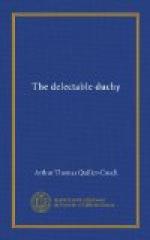“Please, sir, will ‘ee warm Mister Barrabel wi’ this?”
He moved uneasily, and looked harshly at her without answering. “For shame, Annie!” the woman murmured a second time; but I saw her lean back, and a tear started and rolled down her cheek.
“If you please, sir,” repeated Annie, “will ’ee warm Mister Barrabel wi’ this?”
The old gentleman stared round the carriage. In his eyes you could read the question, “What in the devil’s name does the child mean?” The robust woman read it there, and answered him huskily—
“Poor mite! she’s buried her father this mornin’; an’ Mister Barrabel is the coffin-maker, an’ nailed ’en down.”
“Now,” said Annie, this time eagerly, “will ’ee warm him same as the big doll did just now?”
Luckily, the old gentleman did not understand this last allusion. He had not seen the group around the Punch-and-Judy show; nor, if he had, is it likely he would have guessed the train of thought in the child’s mind. But to me, as I looked at my fellow-passenger’s nose and the deformity of his shoulders, and remembered how Punch treats the undertaker in the immortal drama, it was all plain enough. I glanced at the child’s companions. Nothing in their faces showed that they took the allusion; and the next moment I was glad to think that I alone knew what had prompted Annie’s speech.
For the next moment, with a beautiful change on his face, the old gentleman had taken the child on his knee, and was talking to her as I dare say he had never talked before.
“Are you her mother?” he asked, looking up suddenly, and addressing the woman opposite.
“Her mother’s been dead these two year. I’m her aunt, an’ I’m takin’ her home to rear ‘long wi’ my own childer.”
He was bending over Annie, and had resumed his chat. It was all nonsense—something about the silver knob of his malacca—but it took hold of the child’s fancy and comforted her. At the next station I had to alight, for it was the end of my journey. But looking back into the carriage as I shut the door, I saw Annie bending forward over the walking-stick, and following the pattern of its silverwork with her small finger. Her face was turned from the old gentleman’s, and behind her little black hat his eyes were glistening.
II.—A CORRECTED CONTEMPT.
The whistles had sounded, and we were already moving slowly out of St. David’s Station, Exeter, to continue our journey westward, when the door was pulled open and a brown bag, followed by a whiff of Millefleurs and an over-dressed young man, came flying into the compartment where I sat alone and smoked.




